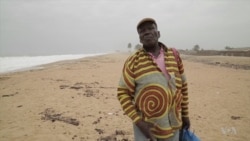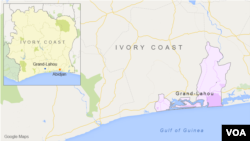Rising sea levels and coastal erosion threaten the homes and livelihoods of hundreds of thousands of people across West Africa. Grand-Lahou, an Ivorian tourist destination, is among the areas slowly being washed away.
The waves are swallowing the coastline of Grand-Lahou’s old town, located about 100 kilometers west of Abidjan, at a pace of 1-to-2 meters a year.
Eugène Koffi has spent his entire life on a shrinking patch of land called Lahou-Kpanda, which is situated between the sea and a lagoon.
"The sea used to be back there, two kilometers away," said Koffi, pointing his finger at the horizon.
Today, it comes up to just a few meters away from where he is standing.
"There used to be people living here," he adds. "There used to be coconut trees."
Coastal erosion is a natural phenomenon, but experts say human activity has accelerated it. And with global warming, sea levels are rising around the world. Here in Grand-Lahou, nearby government dams, as well as the local practice of taking sand to build houses, also have hurt.
Many colonial buildings dating from the early 20th century have washed away. The water has eroded the fence around the church and regularly fills the courtyard. At the cemetery, the tombstones are slowly getting covered by sand.
Koffi says when the lagoon overflows, flooding spreads. Many houses have been abandoned along the coast, and residents have moved inland.
But Koffi insists the place has potential and must be saved.
A few thousand fishermen also soldier on here, but making a living has become harder.
"The river mouth is stuck in the sand," said Issouan, as he worked on his fishing net by his boat. "We can’t cross with the boat."
Biodiversity also is affected, according to Barthelemy Bamba, director of the Center for Ocean Research in Abidjan, which does prevention and awareness work, and advises the Ivorian government regarding the development of future infrastructure like coastal roads.
"In the lagoon, there were mangroves that grow in saline water," Bamba said. "So when the river mouth is closed, the lagoon basically becomes fresh water and the mangroves die off. But mangroves are key for biodiversity. If they die, it’s basically the end of the fishery."
Mangroves consist of trees and shrubs that adapt to a saltwater environment.
The fishermen say the government could help by removing the sand from the river mouth, but experts say the rising sea level is irreversible and the population ultimately will be pushed inland.
It’s a problem along much of West Africa’s coast, and the consequences could be serious. One-third of the region’s people live by the sea, and coastal zones contribute about half of the regional GDP.













